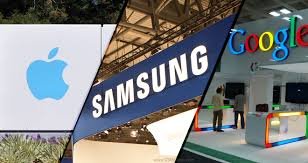In the tech world, it’s easy to focus on the intense rivalry between giants like Apple, Samsung, and Google. They compete fiercely in smartphones, software, and services. But behind the scenes, these companies also rely on each other in ways that highlight the complexity of modern business. Here’s how and why these titans need each other to thrive.
Apple and Samsung: Frenemies in Hardware
Apple and Samsung may appear to be bitter competitors in the smartphone market, but they share a mutually beneficial relationship, especially when it comes to displays.
Samsung’s Role in Apple’s Supply Chain
- Samsung is one of the primary suppliers of high-end OLED displays for Apple’s iPhones. While Apple occasionally works with other suppliers like LG, Samsung remains the leader in producing top-tier screens at the massive scale Apple requires.
- For example, the iPhone X alone required around 180–200 million OLED panels, generating more profit for Samsung than its own flagship Galaxy S8 in 2017.
Why Samsung Doesn’t Cut Apple Off
- On the surface, it might seem like Samsung could benefit from denying Apple its superior displays, forcing iPhones to use lower-quality screens. But economically, that wouldn’t make sense. The revenue from selling millions of OLED panels to Apple far outweighs the potential increase in Samsung phone sales.
- This dynamic illustrates how even direct competitors can find themselves deeply intertwined.
What the Future Holds
- Rumors suggest Apple might switch to micro-LED displays in the future, potentially ending its reliance on Samsung. This would mirror Apple’s move away from Intel chips for Macs. If that happens, it could significantly impact Samsung’s display business.
Apple and Google: The Power of Defaults
Apple and Google’s partnership revolves around search, and it’s one of the most profitable collaborations in tech.
Google’s $20 Billion Deal with Apple
- When you search in Safari on an iPhone, the default search engine is Google. This is no accident—Google pays Apple a staggering $20 billion annually to maintain this default setting.
- The result? Millions of users automatically use Google Search without changing the settings, cementing Google’s dominance in the search market.
Why This Partnership Works
- For Apple: The $20 billion payment adds directly to its bottom line with little effort. Most users expect Google as the default search engine, so there’s minimal disruption.
- For Google: Being the default search engine on one of the world’s most popular smartphones ensures a steady flow of users and search queries, making the investment worthwhile.
Challenges Ahead
- This partnership has drawn scrutiny in an ongoing U.S. Justice Department trial, where regulators argue that such agreements are anti-competitive. If forced to end the deal, Apple might:
- Stick with Google for free.
- Partner with a competitor like Bing or OpenAI’s ChatGPT.
- Launch its own Apple Search Engine, which could be a significant challenge to Google.
Google and Samsung: Partners in Android
While Samsung and Google both make smartphones, their relationship as partners in the Android ecosystem is crucial.
Samsung’s Role in Android’s Success
- Samsung is the face of Android for millions of users worldwide. In North America, Samsung commands five times the market share of Google’s Pixel phones.
- By pre-installing Android and Google services, Samsung ensures Google’s ecosystem—like the Play Store and apps—reaches a global audience.
Google’s Need for Samsung
- Despite making its own Pixel devices, Google often collaborates with Samsung to showcase new Android features. For example:
- Wear OS 3 debuted with a Samsung partnership.
- New Android features often launch simultaneously on Samsung and Pixel phones.
- Samsung’s scale and reach are vital for distributing Android updates and innovations.
Samsung’s Reliance on Google
- Android is the backbone of Samsung’s Galaxy devices. Without it, Samsung would face the daunting task of developing and maintaining its own mobile operating system.
- Google also pays Samsung enormous sums to pre-install apps like Google Search and, more recently, Gemini AI on Samsung phones.
The Bottom Line: A Delicate Balance
These three tech giants are locked in a complex web of competition and collaboration. Each company has something the others need:
- Apple relies on Samsung for hardware and Google for search dominance.
- Samsung benefits from selling components to Apple and Google’s Android ecosystem.
- Google gains from partnerships with both Apple and Samsung to maintain its dominance in search and services.
While they might battle fiercely in public, their behind-the-scenes cooperation highlights an essential truth of modern business: sometimes, even rivals have to work together to succeed.

